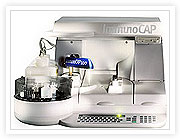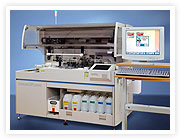Chuang Gung Medical Foundation, Division of Pediatric Allergy, Asthma and Rheumatology - UNREGISTERED VERSION
Main menu
Our Services
Our service
by: Jhong-
Our team consists of an allergist, asthma educator, medical laboratory scientist, asthma case manager, and nurses. We offer various services including an outpatient service, hospitalization, allergen testing, advanced asthma treatment, lung function testing, and health education.
Outpatient setting
Our outpatient service is unique in providing a specific area for allergy children. We provide outpatient services for children from Monday to Saturday. For chronic and stable asthmatic patients, we provide a regular follow-
Most atopic dermatitis patients can be treated in the outpatient area. We provide follow-
Hospitalization
For those patients with severe attacks or other necessities, hospitalization will be arranged. In the hospital setting, various examinations can be offered by cooperating with other specialists for a differential diagnosis of asthma. For example, we cooperate with pulmonologists for bronchoscopy, as well as radiologists for radiologic examinations (upper GI series or chest CT).
For severe and refractory atopic dermatitis patients, hospitalization is usually essential for intravenous medication and advancedskin care. For hospitalized patients, skin care is performed by experienced doctors and nurses.
Examination service
Total IgE and allergen testing
Total IgE and allergen testing is an important procedure in managing allergic disorders. Approximately 80% of childhood asthma is atopic asthma. Our lab provides pioneering examination methods for accurate allergen testing. We have both CAP and MAST for allergen tests, and the ImmunoCAP 1000 is the most advanced CAP allergen method in Taiwan. According to experience, several sets of allergen tests are employed, include those for inhaled allergens, food, seafood, mites, molds, pets and drugs.
In line with other atopic diseases, the total IgE and allergen test could provide novel information for atopic dermatitis control and diagnosis. The common allergens in atopic dermatitis children are food, mites and other common aeroallergens. Milk, egg white, and some kinds of seafood could be important allergens in children, but overly restricting a child’s intake should be done with caution because of the nutritional needs of growing children. Thus, the role of the pediatric allergist cannot be overemphasized.


FOOD ALLERGEN TEST I |
FOOD ALLERGEN TEST II |
FOOD ALLERGEN TEST III |
Shrimp |
Oyster |
Fish(cod) |
Eosinophil cationic protein
Eosinophil cationic protein (E.C.P) is a useful marker to predict the worsening of an allergic disorder. For patients with allergic rhinitis, the monitoring of E.C.P can provide an indication of whether asthma has developed.
